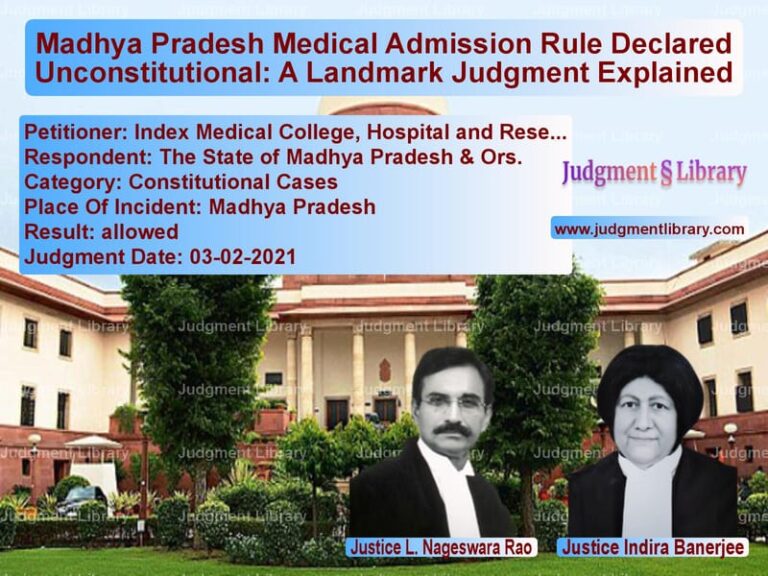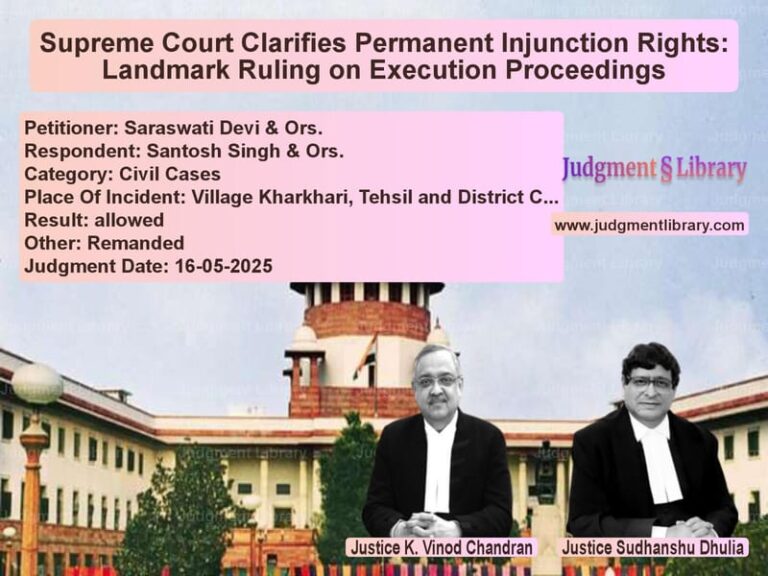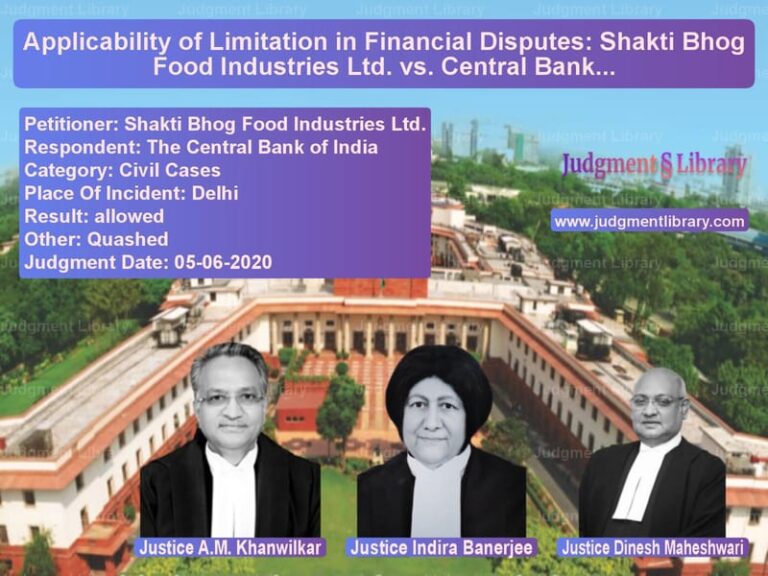Land Compensation and Delay in Justice: Supreme Court’s Verdict on Fair Market Value
The case of Huchanagouda v. The Assistant Commissioner and Land Acquisition Officer & Anr. revolved around the dispute concerning fair compensation for land acquisition. The Supreme Court’s decision addressed crucial aspects of land valuation, delay in seeking justice, and the rights of landowners affected by government acquisitions.
Background of the Case
The government notified the acquisition of land in Veerapur village for the rehabilitation of affected villagers due to the implementation of the Hirehalla Project. The land was notified for acquisition on 16 October 2003, and the Land Acquisition Officer passed an award on 8 March 2006, fixing the land value at Rs. 24,500 per acre. However, upon reference, the market value was increased to Rs. 1,26,500 per acre.
The High Court, considering an earlier land acquisition notification dated 24 November 1994, granted a 5% escalation per annum for the period between 1994 and 2003. As a result, it arrived at a market value of Rs. 1,55,133 per acre, which was rounded off to Rs. 1,56,000 per acre.
Being dissatisfied with the amount, the claimants filed an appeal before the Supreme Court seeking further enhancement in compensation.
Petitioner’s Arguments
The appellants, represented by their counsel, contended:
- The compensation awarded was inadequate, considering the potential development of the land.
- They relied on the judgment in Imrat Lal and Others v. Land Acquisition Collector (2014) 14 SCC 133, arguing that villagers are often unaware of legal technicalities and should not be denied fair compensation due to procedural delays.
- The Court should take a liberal approach in condoning the delay, considering that a large number of similarly placed landowners had been granted enhanced compensation.
- The escalation rate of 5% adopted by the High Court was too low, as land values tend to rise significantly over time, especially in semi-urban areas.
Respondent’s Arguments
The respondents, represented by their counsel, countered:
- The Supreme Court had dismissed an earlier Special Leave Petition (SLP) on a similar matter due to the delay in filing.
- The High Court had already applied a fair escalation of 5% per annum, and any further increase was unjustified.
- The petitioners had approached the Court after significant delay, and such delays should not be condoned as a matter of right.
Supreme Court’s Observations
The Supreme Court, after examining the records and precedents, held that:
- The Court must adopt a liberal approach in condoning delay, particularly in land acquisition cases, as villagers are often unaware of legal intricacies.
- It cited Dhiraj Singh (Dead) Thr. Lrs. And Others v. State of Haryana and Others (2014) 14 SCC 127, which emphasized balancing equities by denying interest for the period of delay rather than outrightly dismissing claims.
- When substantial justice and technical considerations are pitted against each other, substantial justice should prevail.
The Court further noted that land values in developing areas often rise at a higher rate than the 5% escalation applied by the High Court. It referred to the case of General Manager, ONGC v. Rameshbhai Jivanbhai Patel (2008) 14 SCC 745, which recognized that land prices in semi-urban areas typically increase by 10% to 15% annually, while in rural areas, the rise is generally around 5% to 7.5%.
Final Judgment
The Supreme Court enhanced the compensation by applying a 10% annual escalation with a cumulative effect. The revised compensation rates per acre were:
- 1994 – Rs. 1,00,000
- 1995 – Rs. 1,10,000
- 1996 – Rs. 1,21,000
- 1997 – Rs. 1,33,100
- 1998 – Rs. 1,46,410
- 1999 – Rs. 1,61,051
- 2000 – Rs. 1,77,156
- 2001 – Rs. 1,94,872
- 2002 – Rs. 2,14,359
- 2003 – Rs. 2,35,795
As a result, the compensation was increased to Rs. 2,35,795 per acre. However, the Court clarified that the petitioners would not be entitled to interest on the enhanced compensation for the period corresponding to the delay in filing the petition.
The appeals were partly allowed, modifying the High Court’s judgment accordingly.
Conclusion
This judgment reaffirms the Supreme Court’s commitment to ensuring fair compensation for land acquisition while balancing procedural technicalities with substantive justice. It underscores the importance of recognizing potential land development in compensation calculations and the necessity of adopting a liberal approach in condoning delays, particularly when the rights of poor and illiterate villagers are at stake.
Petitioner Name: Huchanagouda.Respondent Name: The Assistant Commissioner and Land Acquisition Officer & Anr..Judgment By: Justice Banumathi, Justice A.S. Bopanna.Place Of Incident: Veerapur Village, India.Judgment Date: 30-07-2019.
Don’t miss out on the full details! Download the complete judgment in PDF format below and gain valuable insights instantly!
Download Judgment: Huchanagouda vs The Assistant Commis Supreme Court of India Judgment Dated 30-07-2019.pdf
Direct Downlaod Judgment: Direct downlaod this Judgment
See all petitions in Property Disputes
See all petitions in Damages and Compensation
See all petitions in Judgment by R. Banumathi
See all petitions in Judgment by A. S. Bopanna
See all petitions in partially allowed
See all petitions in Modified
See all petitions in supreme court of India judgments July 2019
See all petitions in 2019 judgments
See all posts in Civil Cases Category
See all allowed petitions in Civil Cases Category
See all Dismissed petitions in Civil Cases Category
See all partially allowed petitions in Civil Cases Category







